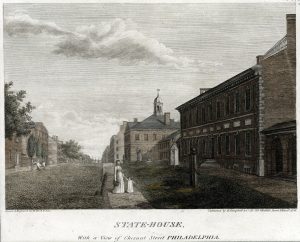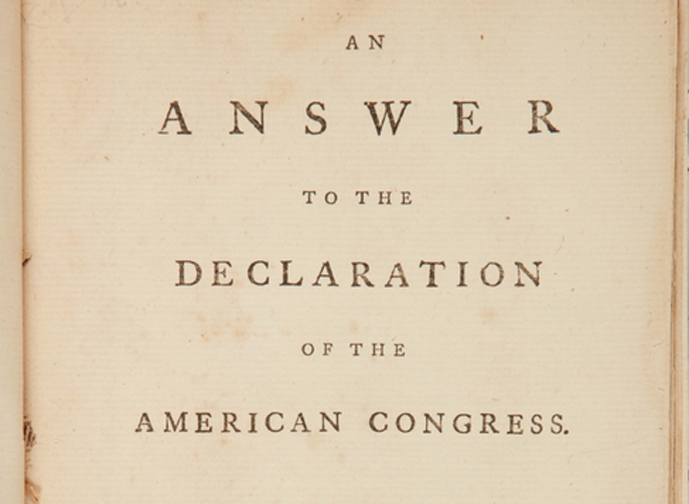To Thomas Jefferson, great plagues were within the genus of republican antibodies. Like the occasional popular insurrection that warned rulers “the spirit of resistance” still existed, a few hundred deaths or so before the pathogenic scythe of a virus discouraged “the growth of great cities in our nation, & I view great cities as pestilential to the morals, the health and the liberties of man.”[1]
In the course of their late-life rapprochement, John Adams would gently chide Jefferson for his blasé outlook towards death and disruption. To him, only those who had read of these types of events from afar could serenely accept, let alone praise them. Jefferson, he admonished, had “never felt the Terrorism” of Shays’ Rebellion, or the Whiskey Rebellion, or, more importantly, the furor stirred up by French Ambassador “Citizen Genet” in 1793, “when ten thousand People in the Streets of Philadelphia, day after day, threatened to drag Washington out of his House, and effect a Revolution in favor of the French Revolution, and against England.”[2]
Barely into Washington’s second term, Edmond-Charles Genet’s brief foray as French ambassador would rock the United States to its political core; leaving one faction convinced that “the flowers of Jacobinical Rhetorick” were leading to blood and anarchy; the other that incipient “Anglomany” was taking America around a cul-de-sac back to British subservience.[3]
The French diplomat had arrived in Charleston in April of ’93, just after news that the National Convention in Paris had executed King Louis XVI and declared war on Great Britain. Reflecting American enthusiasm for France’s struggle for liberty, Genet was met with fanfare at every stop along his route to Philadelphia. “It is impossible for anything to be more affectionate, more magnanimous than the purport of his mission,” Jefferson gushed. “In short he offers everything & asks nothing.”[4]
Suspecting that Genet was, in fact, asking for quite a bit, Jefferson’s enthusiasm eluded Washington. He had just issued a declaration of neutrality enjoining all Americans to “adopt and pursue a conduct friendly and impartial towards the belligerent powers.”[5] Having only just gained its independence, Washington knew that a country that couldn’t even subdue tribes on its frontier faced complete oblivion if pitted against the armed forces across the Atlantic. Neutrality equaled survival, and Genet’s conduct was an existential threat to the United States.
Undeterred by Washington’s declaration, the impetuous Frenchman violated diplomatic protocol and American sovereignty by issuing direct appeals to the people (with Jefferson’s encouragement). Letters of marque bearing his signature were issued to American ships crewed by American sailors to make war against British shipping. Conspiracies were hatched with American civil and military officials in the west to attack Spanish Louisiana and establish an independent republic. Democratic societies were established—first in Philadelphia, then in other cities—to foment popular pressure that would strong-arm Washington into changing course.[6]
By the early summer of ’93 Genet was a fire causing the American pot to boil over. Larger and louder crowds—the very same ones Adams reminded Jefferson of in their retirement—were assembling outside Washington’s residence, raucously demanding that America take up France’s struggle for liberty as France had done for America.
Washington, Federalists, and increasing numbers of Republicans feared that events were escaping their control. “That these societies were instituted by the artful and designing members . . . primarily to sow the seeds of jealousy and distrust among the people” was beyond dispute for Washington. The “father” of it all was Genet, who “under a display of popular and fascinating guises” had instigated “the most diabolical attempts to destroy the best fabric of human government and happiness . . . that has ever been presented for the acceptance of mankind.”[7] Americans’ fondness for France was being manipulated, Alexander Hamilton added, “by every art of misrepresentation and deception to be made the instrument first of controuling[,] finally of overturning the Government of the Union.”[8]
Vice President Adams, who had borrowed muskets from the War Department to defend his home amidst the turmoil, shared these fears: “I am really apprehensive that if our People cannot be persuaded to be more decent, they will draw down Calamities upon our Country, that will weaken Us to such a degree that We Shall not recover our Prosperity for half a Century.”[9]
Yet just when it seemed like it was to fall over the precipice, America was ultimately saved, according to the retired Adams, by an outbreak of Yellow Fever in the capital city. “The coolest and the firmest Minds,” he told Jefferson, “have given their Opinions to me, that nothing but the Yellow Fever . . . could have saved the United States from a total Revolution of Government.”[10]
Exploding late in the summer, the epidemic sent those who could afford to fleeing from the city and those who couldn’t locked inside their homes.[11] By the time it had abated, the Jacobins had taken control of the National Convention back in France and recalled Genet.[12] The imminent threat of insurrection had passed and, according to Adams, it had been Yellow Fever that saved the day.
Was he correct? Did the Yellow Fever epidemic of 1793 save America and its newly-installed constitutional order?
The answer: probably not.

By the time Yellow Fever had exploded in Philadelphia, Genet’s own feverish machinations in America had recoiled upon him. Intoxicated by the “perpetual fetes” held in his honor, and convinced that he had become the supreme influencer in American affairs as a result, he had written to Jefferson asserting that Washington was acting beyond his powers as president in malice towards France and, more specifically, that he had no authority to prevent French consuls from commissioning privateers in American ports—or to prevent said ministers from condemning British merchant ships brought back to them.[13] That power belonged to the true representative voice of the people alone: congress. He then compounded his discourtesy by refusing Jefferson’s request to prevent a French privateer from sailing from the port of Philadelphia that July.[14]
Desperate to quell the Francophile uproar (and to embarrass Genet’s Republican admirers), Hamilton, writing under the pseudonym of “No Jacobin,” revealed that it was “publicly rumored in this City that the Minister of the French Republic has threatened to appeal from The President of The United States to the People.”[15] Genet had crossed a line, and Hamilton wanted the country to know about it. Many Americans might have felt a fraternity with Revolutionary France, but a great deal more reserved an absolute filial devotion to Washington and the independence he had led them to. For Genet to circumvent him was touch the third rail of the early republic.
Seeing the writing on the wall, Jefferson moved to prevent Genet’s impertinence from exploding into a scandal that would humiliate him and the Republican Party. In exchange for not making Genet’s threats public, the secretary of state agreed to quietly request his recall. “I adhered to him as long as I could have a hope of getting him right,” Jefferson lamented. “Finding at length that the man was absolutely incorrigible, I saw the necessity of quitting a wreck which could not but sink all who should cling to it.”[16]
In the span of four months, “Citizen Genet” had gone from being the toast of every town and city on the American seaboard to a wannabe Brutus without friends. The Genet fever running through the streets of Philadelphia had broken, shortly but well-before Yellow Fever filled the void. What had saved the republic—if indeed it had truly needed saving—had not been an epidemic, but the anonymous work of Hamilton, the moderating work of Jefferson, and the reputation of Washington.
American liberty, as it turned out, had abler guardians than a virus.
[1]“To William Smith: Paris, Nov. 13, 1787,” in Merrill D. Peterson, ed., Jefferson:Writings (New York: Library of America 1984), 911; “To Dr. Benjamin Rush: Monticello, Sept. 23, 1800,” Ibid., 1081. For a broader discussion of Jefferson’s views on epidemics, see Geoff Smock, “Thomas Jefferson and the Public Benefits of Epidemics,” Journal of the American Revolution, May 11, 2020, allthingsliberty.com/2020/05/thomas-jefferson-and-the-public-benefits-of-epidemics/.
[2]“To Thomas Jefferson: Quincy June 30th, 1813,” in Gordon S. Wood, ed., John Adams: Writings from the New Nation: 1784-1826 (New York: Library of America, 2016), 557.
[3]“John Adams to Charles Adams: Philadelphia Dec 23. 1793,” Ibid., 298; “To James Madison from Thomas Jefferson, 5 May 1793,” Founders Online, National Archives, founders.archives.gov/documents/Madison/01-15-02-0015.
[4]“To James Madison: Phila, May 19, 1793,” Peterson, ed., Writings, 1008-1009.
[5]“Proclamation of Neutrality,” in John Rhodehamel, ed., Washington: Writings (New York: Library of America, 1997), 840.
[6]For a more detailed account of Genet’s exploits in America, see Thomas Fleming, The Great Divide: The Conflict Between Washington And Jefferson that Defined America, Then And Now (Boston: De Capo Press, 2015), 153-177.
[7]“To Henry Lee: German Town, August 26, 1794,” Ibid., 876.
[8]“Defense of the President’s Neutrality Proclamation, [May 1793],” Founders Online,founders.archives.gov/documents/Hamilton/01-14-02-0340.
[9]“To Charles Adams,” Wood, ed., Adams: Writings from the New Nation, 299.
[10]“To Jefferson,” Ibid., 557.
[11]See Brian Patrick O’Malley, “The Yellow Fever Outbreak of 1793: Nine Observations and Lessons,” Journal of the American Revolution, March 26, 2020, allthingsliberty.com/2020/03/the-yellow-fever-outbreak-of-1793-nine-observations-and-lessons/.
[12]The recall came with the near-certainty that Genet would be executed upon his return. He, somewhat ironically, would avoid that fate by living in America as a refugee for the remainder of his life. Fleming, The Great Divide, 182-183.
[13]As quoted in Stanley Elkins and Eric McKitrick, The Age of Federalism: The Early American Republic, 1788-1800 (New York: Oxford University Press, 1993), 343; “To Thomas Jefferson from Edmond Charles Genet, 22 June 1793,” Founders Online, founders.archives.gov/documents/Jefferson/01-26-02-0312.
[14]“To Thomas Jefferson from Edmond Charles Genet, 9 July 1793,” Founders Online, founders.archives.gov/documents/Jefferson/01-26-02-0402.
[15]“No Jacobin No. I, [31 July 1793],” Ibid., founders.archives.gov/documents/Hamilton/01-15-02-0120.
[16]“To James Madison from Thomas Jefferson, 11 August 1793,” Ibid., founders.archives.gov/documents/Madison/01-15-02-0049. For Jefferson’s role in having Genet quietly removed, see Elkins & McKitrick, Age of Federalism, 362-365.










2 Comments
Excellent, and apropos to our times.
This is a nice look at the feverish atmosphere of 1793. The conclusion that America was not saved by the deus ex machina of an epidemic is a nice refutation of sensationalism, and it makes the broader point that an adherence to Republican principles was more important in saving the new Republic. Well done!